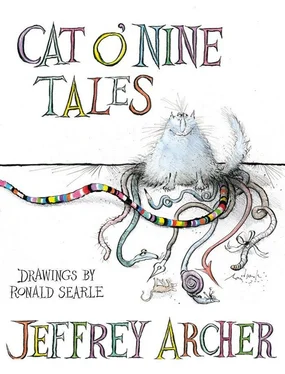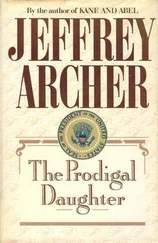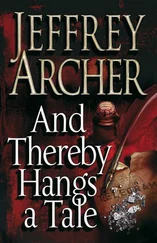Джеффри Арчер - Cat O'Nine Tales
Здесь есть возможность читать онлайн «Джеффри Арчер - Cat O'Nine Tales» весь текст электронной книги совершенно бесплатно (целиком полную версию без сокращений). В некоторых случаях можно слушать аудио, скачать через торрент в формате fb2 и присутствует краткое содержание. Город: London, Год выпуска: 2006, ISBN: 2006, Издательство: Macmillan, Жанр: Современная проза, short_story, на английском языке. Описание произведения, (предисловие) а так же отзывы посетителей доступны на портале библиотеки ЛибКат.
- Название:Cat O'Nine Tales
- Автор:
- Издательство:Macmillan
- Жанр:
- Год:2006
- Город:London
- ISBN:978-0-230-01493-0
- Рейтинг книги:4 / 5. Голосов: 1
-
Избранное:Добавить в избранное
- Отзывы:
-
Ваша оценка:
- 80
- 1
- 2
- 3
- 4
- 5
Cat O'Nine Tales: краткое содержание, описание и аннотация
Предлагаем к чтению аннотацию, описание, краткое содержание или предисловие (зависит от того, что написал сам автор книги «Cat O'Nine Tales»). Если вы не нашли необходимую информацию о книге — напишите в комментариях, мы постараемся отыскать её.
Cat O'Nine Tales — читать онлайн бесплатно полную книгу (весь текст) целиком
Ниже представлен текст книги, разбитый по страницам. Система сохранения места последней прочитанной страницы, позволяет с удобством читать онлайн бесплатно книгу «Cat O'Nine Tales», без необходимости каждый раз заново искать на чём Вы остановились. Поставьте закладку, и сможете в любой момент перейти на страницу, на которой закончили чтение.
Интервал:
Закладка:
It must have been about a year later that Fiona finally agreed to a settlement. All of Bob’s assets were to be divided equally between them, while he would also cover her legal costs. A date was set for a formal signing in chambers. I agreed to act as a witness and give Bob, as Carol described it, much-needed moral support.
I never even took the top off my pen because Fiona burst into tears long before Mrs Abbott had read out the terms, declaring that she was being cruelly treated and Bob was causing her to have a nervous breakdown. She then flounced out of the office without another word. I must confess that I had never seen Fiona looking less nervous. Even Mrs Abbott couldn’t hide her exasperation.
Harry Dexter, whom Bob had selected as his solicitor, warned him that this was likely to end up in a lengthy and expensive courtroom battle if he couldn’t agree to a settlement. Mr Dexter added, for good measure, that judges often instruct the defending party to shoulder the injured party’s costs. Bob shrugged his shoulders, not even bothering to respond.
Once both sides had accepted that an out-of-court settlement could not be reached, a day was fixed in the judge’s calendar for a hearing.
Mr Dexter was determined to counter Fionas outrageous demands with equally fierce resistance, and to begin with Bob went along with all his recommendations. But with each new demand from the other side, Bob’s resolve began to weaken until, like a punch-drunk boxer, he was ready to throw in the towel. He became more and more depressed as the day of the hearing drew nearer, and even began saying, ‘Why don’t I just give her everything because that’s the only way she’ll ever be satisfied?’ Carol and I tried to lift his spirits, but with little success, and even Mr Dexter was finding it harder and harder to convince his client to hang in there.
We both assured Bob that we would be in court to support him on the day of the hearing.
Carol and I took our places in the gallery of court number three, matrimonial division, on the last Thursday in June, and waited for proceedings to begin. By ten to ten the court officials began to drift in and take their places. A few minutes later Mrs Abbott arrived, with Fiona by her side. I stared down at the plaintiff, who was wearing no jewellery and a black suit that would have been more appropriate for a funeral — Bob’s.
A moment later Mr Dexter appeared with Bob in his wake. They took their places at a table on the other side of the courtroom.
As ten o’clock struck, my worst fears were realized. The judge entered the courtroom — a woman who immediately brought back memories of my old school matron — a martinet who didn’t believe that the punishment should fit the crime. The judge took her place on the bench and smiled down at Mrs Abbott. They’d probably been at university together. Mrs Abbott rose from her place and returned the judge’s smile. She then proceeded to do battle for every jot and tittle in Bob’s possession, even arguing over who should end up with his college cufflinks, saying that it had been agreed that all Mr Radford’s assets should be divided equally, so that if he had one cufflink, her client must be entitled to the other.
As each hour passed, Fiona’s demands expanded. After all, Mrs Abbot explained, hadn’t her client given up a rewarding and happy lifestyle in America, which included a thriving family business — something I’d never heard mentioned before — to devote herself to her husband? Only to discover that he rarely arrived home in the evening before eight, and then only after he’d been out with his friends to play squash, and when he eventually turned up — Mrs Abbott paused — drunk, he didn’t want to eat the meal she had spent hours preparing for him — she paused again — and when they later went to bed, he quickly fell into a drunken slumber. I rose from my place in the gallery to protest, only to be told by an usher to sit down or I would be asked to leave the court. Carol tugged firmly on my jacket.
Finally, Mrs Abbot reached the end of her demands, with the suggestion that her client should be given their home in the country (Aunt Muriel’s), while Bob would be allowed to keep his London apartment; she should have the villa in Cannes (Aunt Muriel’s), while he kept his rooms at Harley Street (rented). Mrs Abbott finally turned her attention to Aunt Muriel’s art collection, which she also felt should be divided equally; her client should have the Monet, while he kept the Manguin. She should have the Picasso, he the Pasmore, she the Bacon, etc. When Mrs Abbott finally sat down, Mrs Justice Butler suggested that perhaps they should take a break for lunch.
During a lunch, not eaten, Mr Dexter, Carol and I tried valiantly to convince Bob that he should fight back. But he wouldn’t hear of it.
‘If I can hold on to everything I had before my aunt died,’ Bob insisted, ‘that will be quite enough for me.’
Mr Dexter felt certain he could do far better than that, but Bob showed little interest in putting up a fight.
‘Just get it over with,’ he instructed. ‘Try not to forget who’s paying her costs.’
When we returned to the courtroom at two o’clock that afternoon, the judge turned her attention to Bob’s solicitor.
‘And what do you have to say about all this, Mr Dexter?’ asked Mrs Justice Butler.
‘We are happy to go along with the division of my client’s assets as suggested by Mrs Abbott,’ he replied with an exaggerated sigh.
‘You’re happy to go along with Mrs Abbott’s recommendations, Mr Dexter?’ repeated the judge in disbelief.
Once again Mr Dexter looked at Bob, who simply nodded, like a dog on the back shelf of a car.
‘So be it,’ said Mrs Justice Butler, unable to mask her surprise.
She was just about to pass judgement, when Fiona broke down and burst into tears. She leant across and whispered into Mrs Abbott’s ear.
‘Mrs Abbott,’ said Mrs Justice Butler, ignoring the plaintiff’s sobs, ‘am I to sanction this agreement?’
‘It seems not,’ said Mrs Abbott, rising from her place and looking somewhat embarrassed. ‘It appears that my client still feels that such a settlement favours the defendant.’
‘Does she indeed?’ said Mrs Justice Butler and turned to face Fiona. Mrs Abbott touched her client on the shoulder and whispered in her ear. Fiona immediately rose, and kept her head bowed while the judge spoke.
‘Mrs Radford,’ she began, looking down at Fiona, ‘am I to understand that you are no longer happy with the settlement your solicitor has secured for you?’
Fiona nodded demurely.
‘Then may I suggest a solution, that I hope will bring this case to a speedy conclusion.’ Fiona looked up and smiled sweetly at the judge, while Bob sank lower into his seat.
‘Perhaps it would be easier, Mrs Radford, if you were to draw up two lists for the court’s consideration, that you believe to be a fair and equitable division of your husband’s assets?’
‘I’d be happy to do that, your honour,’ said Fiona meekly.
‘Does this meet with your approval, Mr Dexter?’ asked Mrs Justice Butler, turning back to Bob’s solicitor.
‘Yes, m’lady,’ said Mr Dexter, trying not to sound exasperated.
‘Can I take it that those are your client’s instructions?’
Mr Dexter glanced down at Bob, who didn’t even bother to offer an opinion.
‘And Mrs Abbott,’ she said, turning her attention back to Fiona’s solicitor, ‘I want your word that your client will not back down from such a settlement.’
‘I can assure you, m’lady, that she will comply with your ruling,’ replied Fiona’s solicitor.
‘So be it,’ said Mrs Justice Butler. ‘We will adjourn until tomorrow morning at ten o’clock, when I will look forward to considering Mrs Radford’s two lists.’
Читать дальшеИнтервал:
Закладка:
Похожие книги на «Cat O'Nine Tales»
Представляем Вашему вниманию похожие книги на «Cat O'Nine Tales» списком для выбора. Мы отобрали схожую по названию и смыслу литературу в надежде предоставить читателям больше вариантов отыскать новые, интересные, ещё непрочитанные произведения.
Обсуждение, отзывы о книге «Cat O'Nine Tales» и просто собственные мнения читателей. Оставьте ваши комментарии, напишите, что Вы думаете о произведении, его смысле или главных героях. Укажите что конкретно понравилось, а что нет, и почему Вы так считаете.












